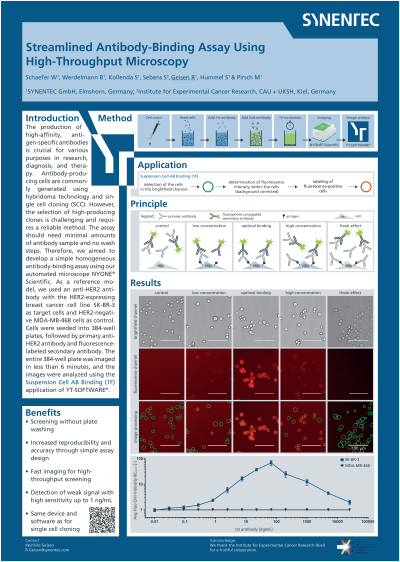Screening Applications & Diagnostics
Poster Session B
(1103-B) Streamlined Antibody-Binding Assay Using High-Throughput Microscopy
Wednesday, May 29, 2024
10:30 - 11:15 CEST
Location: Exhibit Hall

- RG
Reinhild Geisen (she/her/hers)
Head of Cell Culture Application Lab
Synentec
Elmshorn, Schleswig-Holstein, Germany
Poster Presenter(s)
Abstract: In various applications in research, diagnosis, and therapy, the production of high-affinity, antigen-specific antibodies is indispensable. Commonly, antibody-producing cells are generated using hybridoma technology followed by single cell cloning (SCC). This requires a reliable method for selecting high-producing clones. Multiple screening techniques for antibodies in hybridoma supernatants exist, each with advantages and disadvantages. For instance, the widely used enzyme-linked immunosorbent assay (ELISA) demands extensive washing and may compromise antigen conformation. Flow cytometry is highly sensitive, but requires large sample volumes and complex data analysis, while fluorometric microvolume assay technology (FMAT) employs only a single laser. Moreover, these assays do not offer images of the cells for optical control and documentation.
Here, we introduce a homogeneous antibody-binding assay utilizing our automated microscope NYONE® Scientific, circumventing the need for washing steps and minimizing sample volumes by employing an anti-HER2 antibody as a model antibody. The HER2-expressing breast cancer cell line SK-BR-3 served as target cells, while HER2-negative MDA-MB-468 cells were used as a negative control. We seeded the cells into a 384-well plate and initially added the primary anti-Her2 antibody followed by a fluorescently labeled secondary antibody to the wells. We imaged the plate with our automated imager NYONE® Scientific, and the images were automatically analyzed using the newly developed Suspension Cell AB Binding (1F) application of our YT-SOFTWARE®. This application detects cells in brightfield images and evaluates the average fluorescence intensity of the cells using fluorescence images. The image processing application specializes in detecting weak signals with a high background. We achieved a primary antibody detection limit of up to 1 ng/mL through assay and image settings optimization. The assay is suitable for high-throughput screening with a scanning time of less than 6 min for a whole 384-well plate. Moreover, NYONE® Scientific offers the versatility of different fluorescence channels and the ability to measure additional characteristics through the brightfield channel. Combined with our Single Cell Cloning application, both the proof of monoclonality and the screening of hybridoma supernatant can be analyzed using the same device and software reducing time and costs for additional equipment, training, and support.
Here, we introduce a homogeneous antibody-binding assay utilizing our automated microscope NYONE® Scientific, circumventing the need for washing steps and minimizing sample volumes by employing an anti-HER2 antibody as a model antibody. The HER2-expressing breast cancer cell line SK-BR-3 served as target cells, while HER2-negative MDA-MB-468 cells were used as a negative control. We seeded the cells into a 384-well plate and initially added the primary anti-Her2 antibody followed by a fluorescently labeled secondary antibody to the wells. We imaged the plate with our automated imager NYONE® Scientific, and the images were automatically analyzed using the newly developed Suspension Cell AB Binding (1F) application of our YT-SOFTWARE®. This application detects cells in brightfield images and evaluates the average fluorescence intensity of the cells using fluorescence images. The image processing application specializes in detecting weak signals with a high background. We achieved a primary antibody detection limit of up to 1 ng/mL through assay and image settings optimization. The assay is suitable for high-throughput screening with a scanning time of less than 6 min for a whole 384-well plate. Moreover, NYONE® Scientific offers the versatility of different fluorescence channels and the ability to measure additional characteristics through the brightfield channel. Combined with our Single Cell Cloning application, both the proof of monoclonality and the screening of hybridoma supernatant can be analyzed using the same device and software reducing time and costs for additional equipment, training, and support.
